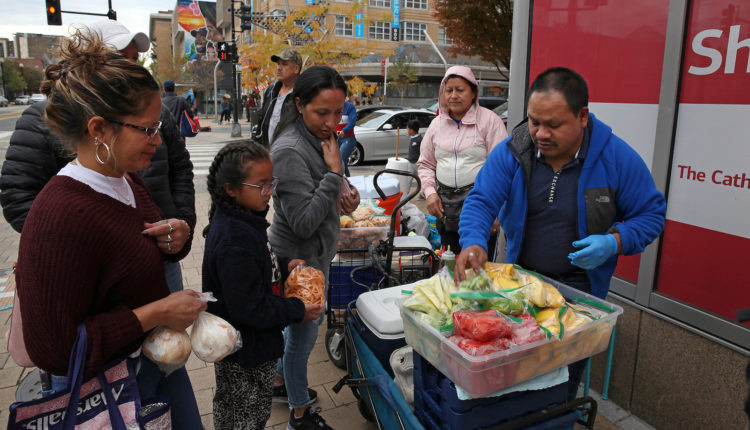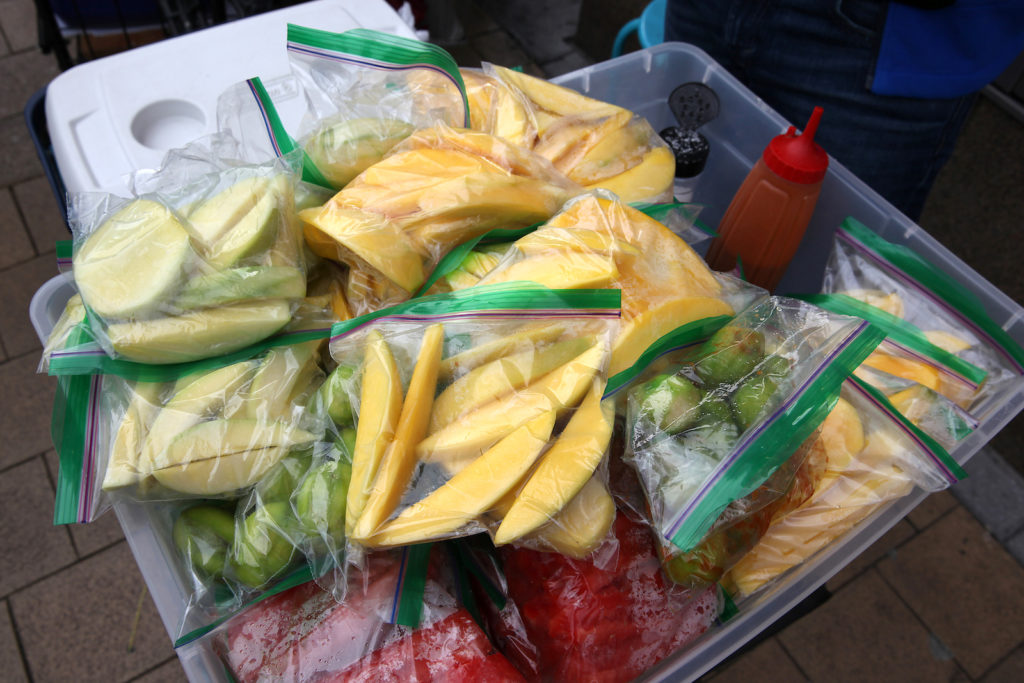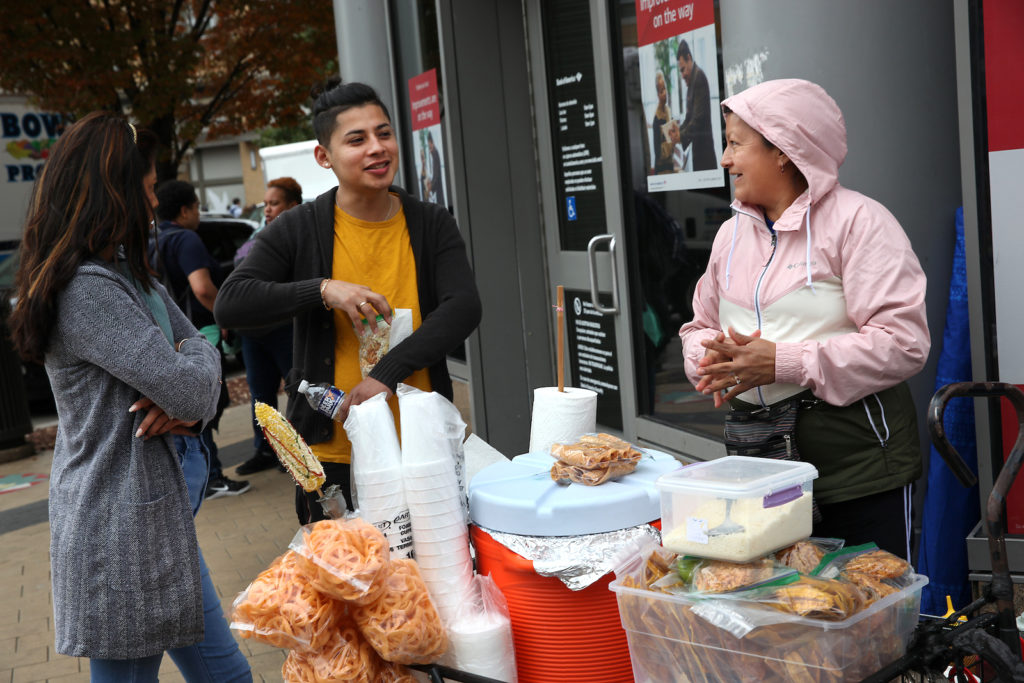
Columbia Heights vendors push to gain legal vending rights — and protect their place in the neighborhood
On an overcast Saturday afternoon, business is starting to pick up at 14th and Irving streets NW across from the Columbia Heights Metrorail station. While some shoppers head into the DC USA mall, others approach the thriving community of street vendors on the adjoining sidewalk: Cristobal selling mangoes and watermelons, Chris selling original paintings of Michael Jackson and Prince, and Gustav selling Native American jewelry and handmade paintings.
When three Metropolitan Police Department (MPD) officers walk by, though, the atmosphere on the corner turns guarded and cautious. Due partially to a bureaucratic logjam at the DC Department of Consumer and Regulatory Affairs (DCRA), the vendors on the sidewalk are unlicensed. And amid what vendors describe as an increase in DCRA inspections and policing in recent months, their relationship with MPD is tense.

Vending has long been a feature of street life in the Columbia Heights neighborhood, and with a few exceptions it has been conducted largely outside the legal system. Vendors say that for a variety of reasons they haven’t been able to get licenses to sell on the streets legally. And in response to a jump in calls reporting them — which some vendors attribute mostly to the DC USA mall — they say they’ve seen an accompanying increase in encounters with MPD and DCRA, some of which have been violent or aggressive.
One such incident went viral on Twitter on Nov. 20; video posted on the site shows police officers struggling with15-year-old Genesis Lemus selling plantain chips on the sidewalk, threatening to separate them from their parents and injuring one of the children’s legs. The event led to a GoFundMe page that has raised more than $5,000 and prompted discussion at a community meeting this week in an effort to hold police, local government and the mayor accountable.
Months earlier, street vendors in the area began organizing with the help of Many Languages One Voice (MLOV) — an immigrant-based nonprofit that has advocated for marginalized communities in the District since growing out of the DC Language Access Coalition in 2010. The vendors, who are also getting assistance from Ward 1 DC Council member Brianne Nadeau, hope that soon they’ll be able to sell their wares legally.
Maria Isabel Guevarra, also known as Colochita or Curly, said she was the only vendor in Mount Pleasant when she started 26 years ago. At the time she was a recent immigrant from El Salvador working in a restaurant, where she made $150 a week working 16 hours a day — not enough to send back to her family in El Salvador. So she quit and started selling mangos, tamales and taquitos on the street.
Guevarra’s story is similar to many of those collected in late September by MLOV’s Vendedora Project, an effort to give voice to Columbia Heights’ street-vendor community. Many vendors are from El Salvador or other Latin American countries. Some worked as street vendors before they emigrated. With families to provide for and little other work experience, they turned to vending for income here as well. It’s not uncommon to see vendors’ children working with them.
Since street vending without a license is illegal, there has always been some pushback from authorities. Guevarra said she’s been arrested four times for illegal vending over the years and has lost about 100 hours of work “when the police interfered with my labor.” She said the police started disrupting her work again last summer.
Vendors report a range of issues with the police, including threats of arrest and verbal harassment. They note that MPD officers generally don’t bother them unless the officers are accompanied by DCRA inspectors. MPD says that it is simply responding to complaints made to the department.
“These complaints include calls to 911 requesting that officers respond out and investigate,” Sean Hickman, an MPD spokesperson, wrote in a statement to The DC Line issued before the Nov. 20 incident. “Officers responding to these calls have located individuals that do not have the appropriate city vending or health licenses. In these instances, officers direct the vendors to cease vending, or in some cases of repeat offenders, officers issue citations for Vending Without a License.”
The DC USA mall, which some vendors say is responsible for many calls to MPD, did not respond to a request for comment.
Megan Macaraeg, director of labor organizing for MLOV, expressed a common concern among vendors by questioning whether the police response is appropriate. “What’s the real crime? A city making a quick buck fining poor people or hard-working single moms feeding us mangoes and pupusas?” she said.
Citations present a particular problem for the vendors because they often struggle to pay them. Guevarra said her cart was confiscated by MPD once, costing her about $900 to replace it. She’s also received two $300 fines and six $50 fines in the past.
There are a number of obstacles to vending legally. The District Department of Transportation designates certain parts of the sidewalk as suitable for vending, and there are no more eligible sidewalk spaces in the area around 14th and Irving streets. Vendors also need to prepare food in a commercially licensed kitchen to sell it on the sidewalk, and there are regulations around what kind of cart they’re required to use.
Licenses to vend food on the sidewalk can cost more than $1,600, money the vendors say they don’t have. And despite DC’s language-access programs, many of the vendors say they still have trouble navigating the licensing process because they speak limited English.
At a storytelling workshop hosted by MLOV in late September, about half a dozen street vendors said they had been turned away by DCRA in the past when seeking a license to sell food on the street. Many said they would prefer to work within the system but haven’t been able to.
The underlying issue is the gentrification of Ward 1, according to Nadeau, now in her second term as a DC Council member. She cited a similar scenario that played out in the ward in 2008: Unlicensed vendors were selling in front of the Catholic Shrine of the Sacred Heart on 16th Street, until the DC Office of Latino Affairs moved them to Unity Park, a small triangle of land in Adams Morgan.
The vendors operated there under a special agreement with the DC Department of Parks and Recreation (DPR), but were the subject of numerous complaints from the neighborhood. In 2011 their agreement with DPR ended and they were forced to leave. Some of the vendors moved to a privately owned site at 3505 14th St. NW, and their unofficial market in Unity Park was closed. She said a similar issue is playing out now for Columbia Heights’ vendors: Some members of a gentrifying neighborhood are squeezing out the street life that helped make the neighborhood attractive.
Some members of Advisory Neighborhood Commission 1A — which represents Columbia Heights and Park View — have been supportive of the vendors. Christine Miller and Zack Rybanczyk in particular have been involved in conversations among vendors, various DC agencies and MLOV. Miller said she has sought to enable the vendors to work within the system and to stay away from overly punitive measures, emphasizing the importance of street vending to Columbia Heights’ identity. “It is an asset to the community,” she said of street vending. “They were here before I got here 16 years ago.”
“This issue is really one of the symptoms of gentrification in Columbia Heights,” Nadeau said. “When we hear these stories about people calling the police on street vendors, we do have to be a little more introspective and ask ourselves, ‘Why is it happening?’ ”

Through their partnership with MLOV, some Columbia Heights vendors have issued a list of demands as part of their efforts to organize and resolve their differences with the District. The goal is threefold: access to some form of affordable, language-accessible permit; a “nothing about us without us” policy that guarantees vendors are present at all future negotiations with DCRA; and forgiveness for fines they’ve received along with restitution for incidents of harassment.
In regard to the second and third goals, progress is underway. In late October, Nadeau convened a meeting with some vendors and MPD commanders in charge of the Third and Fourth districts to give vendors a chance to talk about their experiences. She said the police and vendors were able to compromise on the best ways to interact in the future.
“There were even some children in the meeting who talked about what happened when they were out with their parents as vendors and how upsetting it was to them,” Nadeau said. “I think we were able to really drill down on some troubling behavior by particular officers that we are going to be able to resolve. … Even when someone is unlawfully vending, we want to treat them with respect and understand the complexity of needing to provide income for your family and not having access to a legal means to do that.”
Addressing the fines, though, may be more difficult. Nadeau said she does not have the authority to waive them. It’s possible to appeal citations like these, but the vendors were, in fact, breaking the law by vending without a license — which they acknowledge — so they don’t have a strong legal basis to contest the fines.
As for the vendors’ first demand — finding a pathway to full licensing — progress is slow-going but in the works. Nadeau said that she is working with DCRA and the District Department of Transportation on a licensing solution. Licenses might be available elsewhere in the neighborhood, according to Nadeau, or the District might opt to give the vendors a farmers market license and set them up in a triangle park.
MPD says it’s on board with working with the vendors. “MPD has met with Council Member Nadeau’s office to work with vendors and appropriate agencies in order to get these vendors the appropriate vending licenses,” the MPD spokesperson wrote.
Nadeau said she’s examining other city regulations that might be overly stringent for street vendors, like the rules on what kinds of carts are allowed (most of the vendors now use portable coolers, which are not up to code). Her office has also been working with vendors to find a place that might be able to provide a commercially licensed kitchen. “The goal ultimately is to get everybody fully licensed,” she said.
Despite the challenges they face, the vendors said at MLOV’s storytelling event that they enjoy their work and see it as more than just a way to make a living. They say street vending is a way to serve the community. One vendor notes that they’re the “eyes and ears” on the street discouraging crime. Another says with pride that the vendors provide young people with fruit and healthy snacks with a strong cultural connection instead of junk food.
“I love this job. I’ve developed good relationships with my customers, and I’ve been able to see kids grow up,” said Balmore Tobar, a vendor who fled El Salvador in 1978 because of political violence. “I would like a safe, secure way to do what is a great service to the community and uphold our culture through food.”


what about all the taxes they never paid for selling their goods under the table?
“We do have to be a little more introspective and ask ourselves, ‘Why is it happening?’”
Well,
“The District Department of Transportation designates certain parts of the sidewalk as suitable for vending, and there are no more eligible sidewalk spaces in the area around 14th and Irving streets. Vendors also need to prepare food in a commercially licensed kitchen to sell it on the sidewalk, and there are regulations around what kind of cart they’re required to use.”
Who cares about food or pedestrian safety when there’s pandering to do, right?